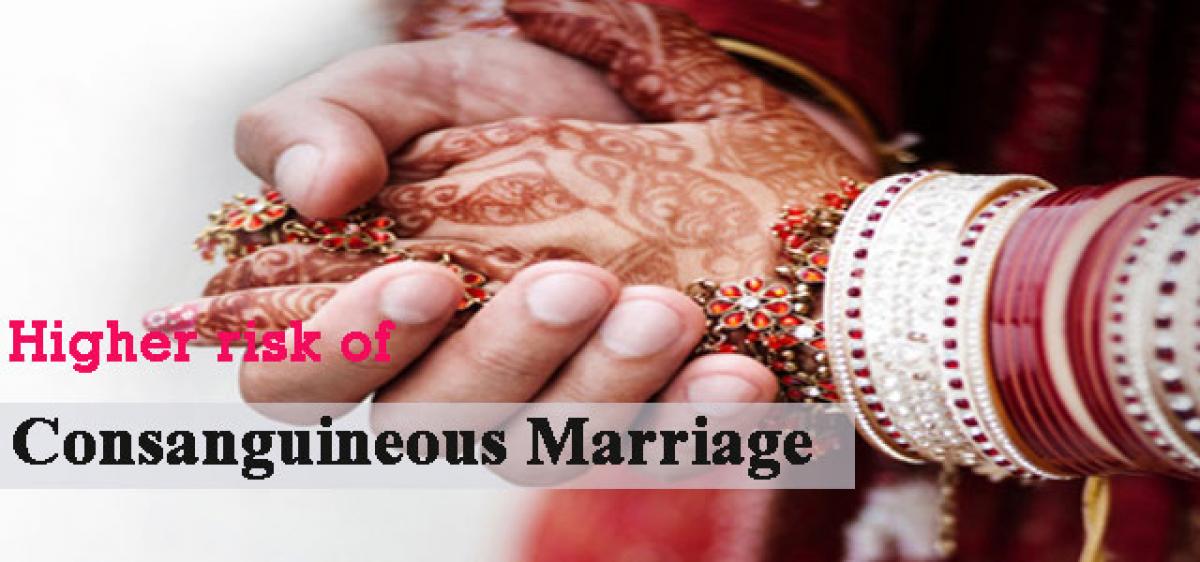Live
- YSRCP completely neglected irrigation: Nimmala
- Pemmasani assures to complete UGD works in Guntur
- Tumakuru dist to eliminate maternal, infant mortality
- BJP to observe Good Governance Day on Dec 25
- Why is ECI afraid of transparency: Cong
- Parliament tussle puts every Indian to shame
- GST at 18% on used EV car sale
- Collector takes part in cleanliness drive
- Ramraj Cotton opens new showroom at Jangareddygudem
- Nine persons killed in two separate accidents
Just In

If your parents have selected one of your cousins as your soul mate, think twice before giving your nod. This may seem normal in your society but may not be so when you consider the health of the future offspring.
The offspring born out of a consanguineous marriage is at a higher risk of developing diseases like congenital and non- congenital heart diseases, epilepsy, mental and blood disorders
If your parents have selected one of your cousins as your soul mate, think twice before giving your nod. This may seem normal in your society but may not be so when you consider the health of the future offspring.
What is consanguineous marriage?
Marriage between close blood relatives is known as consanguineous marriage. Such marriages are more prevalent in Middle East, West Asia, North Africa and South India. In many countries such traditions are still followed mainly for social reasons. Usually these are unions between first cousins, uncle and niece or more distant blood relatives.
Indian scenario
Such practices are socially and culturally favoured in states like Andhra Pradesh, Tamil Nadu and Karnataka and in communities such as Muslims and Parsi. In these societies, it is believed that marriage within family is a safe bet, due to better understanding and bond among families, and retention of wealth within the family.
Problems with consanguineous marriage
Various studies across the globe have revealed a direct correlation between consanguineous marriage and issues with the offspring. These problems are mainly but not limited to congenital defects, still births and early infant deaths.
Biologically for certain disorders to manifest in an individual two copies of the defective gene need to be inherited. Offspring’s of a consanguineous union have higher probability of receiving two recessive alleles (two copies of same defective gene) one each from related parents leading to such abnormalities. Meaning if people marry within their blood relation, their genetic makeup will be similar as they share an ancestor; hence manifestation of silent genetic defects is more likely in their offspring.
On the other hand, marrying outside the family or a non-consanguineous union reduces the inheritance of such defects as it combines two different genes from different pool. The closer the relationship between the prospective couple greater is the chance of conceiving an abnormal offspring. However, in communities where consanguineous marriages are common for a long time the prospective couple may actually be at an increased risk than the degree closeness overtly suggests.
Children born of consanguineous marriages are at a higher risk of developing diseases like congenital and non- congenital heart diseases, epilepsy, mental and blood disorders. Such abnormalities add to the increasing health burden in India. This, ideally, requires an appropriate response in place with availability of sufficient genetic diagnostics, counselling services coupled with educative programmes across the country.
Need of the hour
Marriage facilitates the propagation of one’s genetic material by way of children. Heterogeneity in this genetic material allows for variety and less duplicity and risk in the DNA. Marrying within families reduces this variety and can pose risks of the amplification of genetic defects in the progeny. Families with history of consanguineous marriages are encouraged to seek genetic testing for their children. If possible even a pre-conception and pre-marital genetic testing.
Above all, it is important to increase awareness among public on the potential pitfalls with consanguineous marriages, though it is deep-rooted social trend. Countries have to rise above their, economic and social problems to a space, where masses are educated, robust health system is in place and effective policies and guidelines are formed to confront these issues.
By: Dr Priya Kadam
The writer is a Programme Director at MedGenome Claria.

© 2024 Hyderabad Media House Limited/The Hans India. All rights reserved. Powered by hocalwire.com







